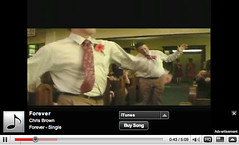 Image by Crystl via Flickr
Image by Crystl via Flickr
During the interview, the following question came up:
"What's going to replace Twitter".
I think that question has an unknowable answer. And not just because we can't predict the future. But because we don't know what we need -- yet. Before Twitter, none of us knew we needed an web/SMS/IM mashup that limited you to 140 characters.
Before Flickr, we assumed you had to know HTML and FTP in order to share your photos with family and friends.
Before Facebook, we didn't know that we needed private profiles, or that value was to be had allowing fellow students and co-workers access to said profiles.
Before YouTube, we didn't know we could create mini-movies and get them to our friends with ease and speed, so they could spread them around for us.
So the question of what's going to replace Twitter is as silly as it is unknowable. I use all of the networks above. Neither one replaces the other. Sure, I could use Photobucket, MySpace, Vimeo, or Dodgeball, but I don't. Yet plenty do. They don't need to switch to my tools, and I don't need to switch to theirs. They get the same benefits I get with my preferred tools.
So don't try and build a "twitter killer". Try and build something entirely new that lets me do things my current toolbox won't. That's going to be The Next Big Thing.
Related articles by Zemanta
- Social media should make your city communicate better (funanymore.com)
![Reblog this post [with Zemanta]](http://img.zemanta.com/reblog_e.png?x-id=96b5765d-75a7-4c4c-b31c-4163aeb2ac6f)

![Reblog this post [with Zemanta]](http://img.zemanta.com/reblog_e.png?x-id=c3402420-9f70-498a-969d-b54975e31151)

![Reblog this post [with Zemanta]](http://img.zemanta.com/reblog_e.png?x-id=64962b6e-aadc-4296-a058-e222b27b2f2a)

![Reblog this post [with Zemanta]](http://img.zemanta.com/reblog_e.png?x-id=0860b03e-1594-44a5-8b0a-cebe1e1499cc)

![Reblog this post [with Zemanta]](http://img.zemanta.com/reblog_e.png?x-id=b4a13c1d-d312-4438-bb50-5dd5d902edf6)

![Reblog this post [with Zemanta]](http://img.zemanta.com/reblog_e.png?x-id=0323a216-90cc-408c-bdfd-a0d82df0a6e3)

![Reblog this post [with Zemanta]](http://img.zemanta.com/reblog_e.png?x-id=255a480e-198c-4da6-8003-865ede69fa69)